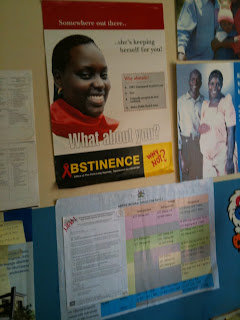Photos from some recent fun things....
CHAI retreat.... we had a really good (and fun) overnight retreat in the Mabira rainforest a few weeks ago
Thanksgiving
I hosted a mini-Thanksgiving for 14 on the Saturday after Thanksgiving. Menu: rustic zucchini and onion stuffing, green beans with goat cheese feta, mashed potatoes, pumpkin puree, cornbread, and apple crisp. No turkey (and no cranberries as they don't grow them here), but very tasty.
One detail I forgot to mention (probably because it is sadly so normal here) is that the power went out at 6pm.... thankfully I had baked most things before then and we had plenty of gas, so we made do and had a nice candlelit dinner.
Going away Party
With an office full of expats, you get used to people coming and going fairly frequently. We hosted a going away barbecue for 2 co-workers and a friend the weekend before last in my yard.
One of the girls leaving used to work for a refugee rights organization in which a band of refugees from an assortment of African countries had assembled -- they came and played for the party.
It has been really fun to have enough space to host people - I'm starting to build a repertoire of party foods. Chief among these might be green bean salad, which is just blanched green beans, butter, white vinegar, and goat cheese feta. It's very simple, but the goat cheese feta (made by Zach at the market I go to on Saturday mornings) is delicious, so it works really well.
One slightly bizarre, but really nice thing about hosting people here is that if it seems like too much to clean up after the party, we can hire someone to come do all the dishes and clean everything up for $5-10.
CHAI retreat.... we had a really good (and fun) overnight retreat in the Mabira rainforest a few weeks ago
Thanksgiving
I hosted a mini-Thanksgiving for 14 on the Saturday after Thanksgiving. Menu: rustic zucchini and onion stuffing, green beans with goat cheese feta, mashed potatoes, pumpkin puree, cornbread, and apple crisp. No turkey (and no cranberries as they don't grow them here), but very tasty.
Going away Party
With an office full of expats, you get used to people coming and going fairly frequently. We hosted a going away barbecue for 2 co-workers and a friend the weekend before last in my yard.
One of the girls leaving used to work for a refugee rights organization in which a band of refugees from an assortment of African countries had assembled -- they came and played for the party.
It has been really fun to have enough space to host people - I'm starting to build a repertoire of party foods. Chief among these might be green bean salad, which is just blanched green beans, butter, white vinegar, and goat cheese feta. It's very simple, but the goat cheese feta (made by Zach at the market I go to on Saturday mornings) is delicious, so it works really well.
One slightly bizarre, but really nice thing about hosting people here is that if it seems like too much to clean up after the party, we can hire someone to come do all the dishes and clean everything up for $5-10.




















































